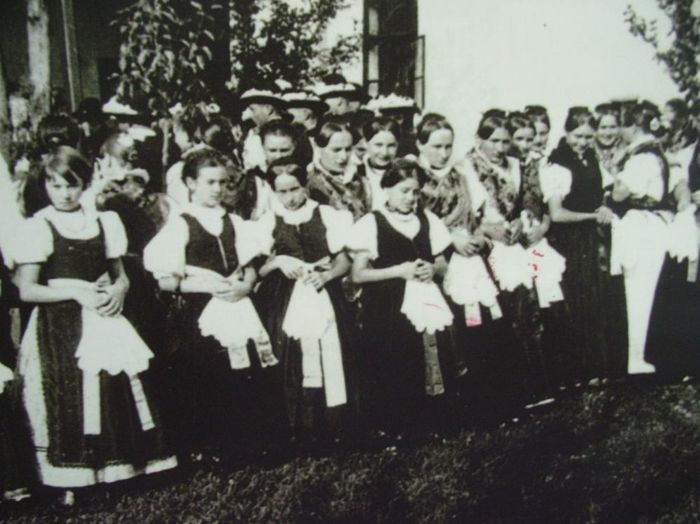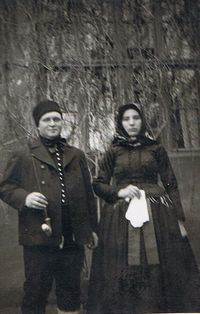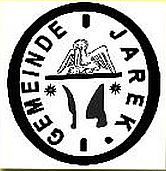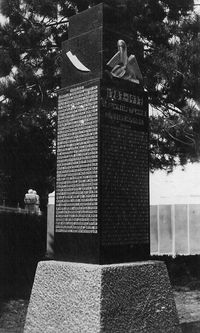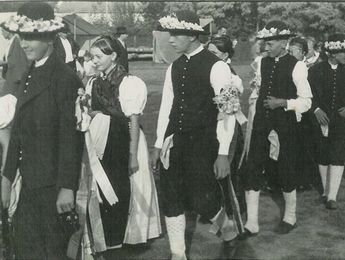The Sesquicentennial Celebrations in Jarek
On August 14th and 15th, 1937 the 150th anniversary celebrations of the settlement took place in Jarek. It was the largest festival that had been celebrated until then. Many guests from the neighboring communities and 200 relatives from Germany, which had been located through genealogical research, had announced their attendance. Also an attaché of the German embassy in Belgrade was among the guests. All Jarekers had prepared themselves intensively for this great event. The commemorative publication (Festschrift), the first Jarek Heimatbuch, was completed just in time. The order of celebration still exists. It was published in German and Serbian.
The celebration began on Saturday morning at 5 o'clock with trumpet fanfares from the steeple of the Lutheran church; at 9 o'clock followed the divine service in the church. The sermon on Saturday was given by Pastor Franz Morgenthaler. This solemn festive worship service was framed by the singing of two choirs under the direction of the cantor, Teacher Wilhelm Heinz. After that the celebration proceeded to the unveiling of the new ancestors' memorial, which had been erected in the church yard to the left of the entrance to the church. On front of this memorial of black marble the names of 80 immigrant families of 1787 were listed and on the back were the names of the straggler families. At the upper edge the components of the Jarek coat-of-arms were engraved: the pelican, which nourishes its young with its blood, as well as the coulter and the plowshare, the symbols for the fertile fields of the Jarek farmers.
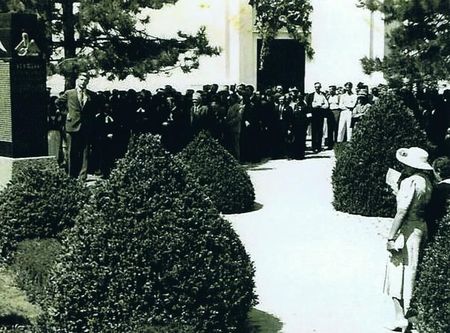
The dedication address at the ancestors' memorial was held by Senior Peter Scherer; an additional speech by a guest from Germany. This dignified celebration was framed by the hymns and songs sung by both choirs.
In connection with the dedication the people gathered in the festival tent for the festival meeting of the political community, the church congregation and the societies. Here again followed speeches.
After the festive lunch, which the Jarek housewives had prepared for the family and its guests from the daughter communities and from Germany, everyone met at 4 o'clock at the cemetery for a commemoration of the dead. The families had time in between to have pictures taken with their German relatives at the ancestors' memorial.
At night all festival guests could attend a theater performance under the direction of Dr. Franz Wallrabenstein, at which choral speaking and a play in five acts were performed.
A large festival tent had been put up at the site behind the pharmacy and the mill since there was no large community hall in Jarek. During the two days of the celebration there was a museum exhibit in “Wild School” which was open mornings from 7 o'clock till 7 o'clock evenings.
The festival continued on Sunday. In the morning the representative of the King, the Infantry Colonel, Mr. Dusan Petrovic, was picked up from the train station in a beautifully decorated carriage and driven to the festival tent, where the worship service took place this time. The representative of the bishop, Konsenior Karl Peter, gave the sermon.
At ten A.M. the great festival session began. After the singing of the Yugoslav national anthem the chairman of the festival committee, Mr. Jakob Greuling, opened the festival meeting. Notary Böhm gave the welcoming speech, and after the reading of the festival telegram to the king and cheers of the assembly for the royal family, Dr. Johann Schmidt gave the festival oration.
After lunch the great procession in traditional costumes took place. It was to be a “costume-wedding” procession in which only wearers of costumes could take part. All classes of ages, from child to grandfather and grandmother, were to portray the “wedding guests.” The “costume bride,” Resi Schurr, and the “groom,” Peter Wack, accompanied by the “bride’s men” and the “bride’s maids” went from village limits in the south through the “Hauptgasse” to the festival grounds. The remaining “wedding guests” followed after. In the festival tent a great costume festival took place, at which the child and adult wearers of costumes performed folk dances, including also the ribbon dance.
The two-day festival ended with a social evening, which was performed by the guests who had arrived from Germany.
It was said that the representative of the king, who unfortunately spoke only High German, had understood nothing of the festival speeches in Jarek dialect. He was to have enjoyed the food very much though. The guests from Germany, however, had no problem understanding, since nearly all had come from the Palatinate and from Württemberg, the homeland of most of the Jarekers.
The two-day 150th-anniversary celebrations certainly were an occasion for the Jarekers and their guests from Germany and the neighboring communities which they remember fondly even today.





